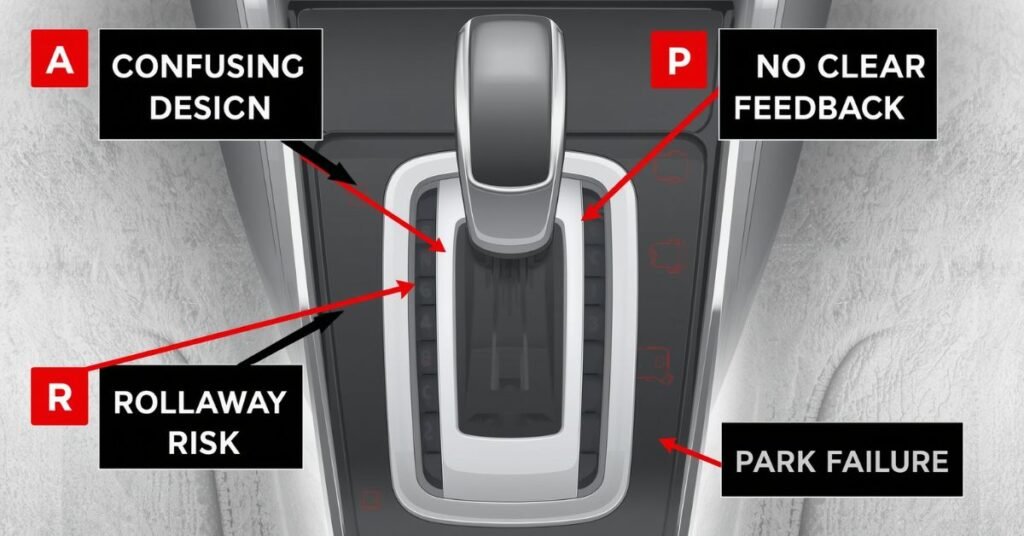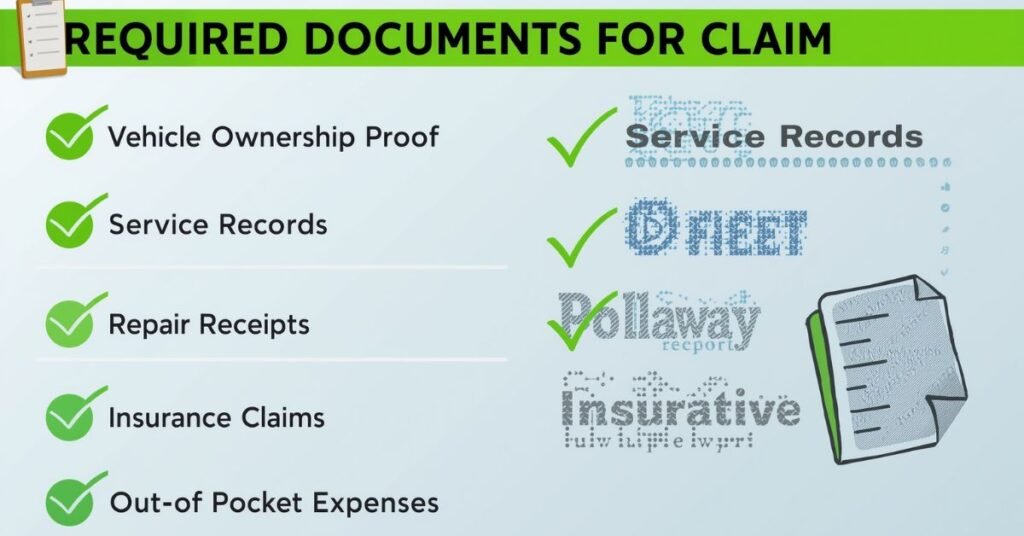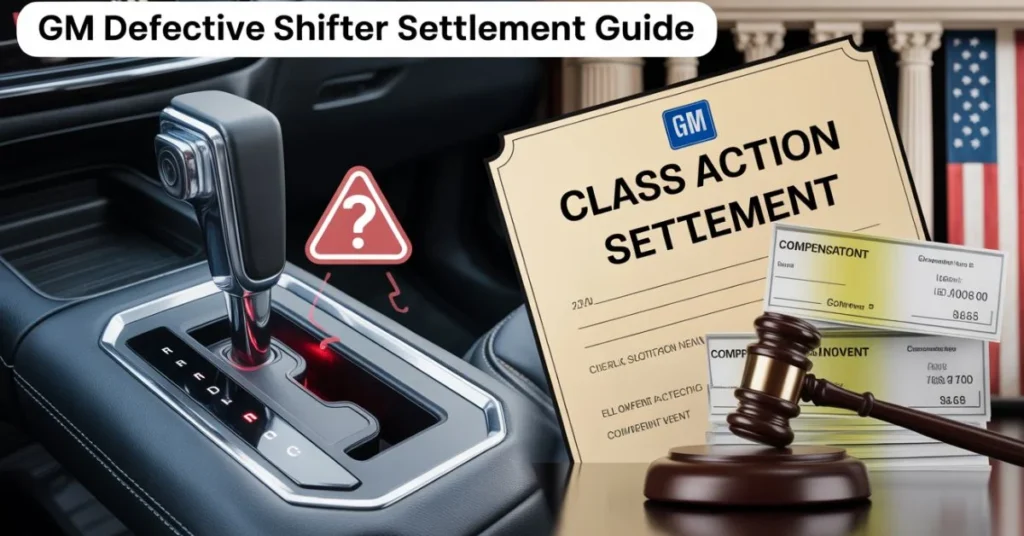The GM defective shifter settlement has brought significant attention to a critical safety issue that has affected millions of General Motors vehicle owners across the United States. This landmark settlement addresses concerns about faulty gear shifters in various GM models that failed to function properly, leading to serious safety risks including rollaway incidents, property damage and tragic injuries. Understanding your rights under this settlement is crucial if you own or owned an affected GM vehicle.
General Motors has faced mounting pressure from consumers, safety advocates, and regulatory bodies regarding shifter defects that allowed vehicles to roll away unexpectedly. The settlement represents a significant step toward compensating affected owners and implementing corrective measures. This comprehensive guide will walk you through everything you need to know about the GM defective shifter settlement, including eligible vehicles, compensation options, claim procedures, and important deadlines.

Understanding the GM Shifter Defect Issue
The GM defective shifter settlement stems from a design flaw in the electronic gear shift system found in numerous GM vehicles manufactured between 2013 and 2019. The problematic shifter design was not intuitive, making it difficult for drivers to determine whether their vehicle was actually in Park. This confusing interface led to situations where drivers believed they had shifted into Park when the vehicle was actually in a different gear, causing unexpected rollaway incidents.
The National Highway Traffic Safety Administration (NHTSA) received hundreds of complaints about these shifter defects, documenting cases of vehicles rolling away after drivers exited, resulting in injuries and fatalities. The issue prompted multiple recalls affecting millions of vehicles across various GM brands including Chevrolet, Cadillac, Buick, and GMC. Despite GM’s reputation for producing powerful and reliable powertrains, including their acclaimed LS engine series, this shifter defect revealed critical oversights in user interface design and safety testing protocols. This isn’t the first time GM has faced significant safety concerns, as the automaker has dealt with multiple recalls and safety issues over the years, highlighting the importance of consumer vigilance.
Key Problems with the Defective Shifters
- Confusing design: The electronic shifter mechanism lacked clear tactile feedback, making it difficult to confirm the selected gear
- No audible warnings: Insufficient warning systems to alert drivers when exiting the vehicle while not in Park
- Rollaway risk: Vehicles could roll away unexpectedly, causing accidents, injuries, and property damage
- Inconsistent performance: The shifter sometimes failed to engage Park properly even when drivers attempted to do so.
Vehicles Covered Under the GM Defective Shifter Settlement
The GM defective shifter settlement covers a wide range of popular GM vehicles equipped with the problematic electronic shifter. Below is a comprehensive table of the primary models included in the settlement:
| Brand | Models Covered | Model Years |
| Chevrolet | Malibu, Impala, Volt, Corvette | 2013-2019 |
| Cadillac | ATS, CTS, XTS, ELR | 2013-2019 |
| Buick | LaCrosse, Regal | 2014-2019 |
| GMC | Terrain, Acadia | 2013-2019 |
| Chevrolet | Camaro, Silverado, Tahoe, Suburban | 2014-2019 |
| Cadillac | Escalade | 2015-2019 |
If you own or previously owned any of these vehicles during the specified time period, you may be eligible for compensation under the settlement.

Compensation Available Under the Settlement
The GM defective shifter settlement offers various forms of compensation depending on your specific circumstances and the impact the defect had on your vehicle ownership experience. Understanding these compensation categories will help you determine what you may be entitled to claim.
Types of Compensation Available
Cash Payments: Eligible class members can receive monetary compensation ranging from $50 to several thousand dollars, depending on factors such as:
- Whether you experienced a rollaway incident
- Property damage sustained due to the defect
- Personal injury claims related to the shifter malfunction
- Out-of-pocket expenses for repairs or rental vehicles
Reimbursements: The settlement includes provisions for reimbursing expenses directly related to the shifter defect, including:
- Repair costs for damage caused by rollaway incidents
- Rental car expenses if your vehicle was unsafe to drive
- Towing fees related to the defect
- Diminished vehicle value claims
Future Benefits: Some settlement provisions include:
- Extended warranty coverage for the shifter mechanism
- Priority service at GM dealerships for shifter-related issues
- Software updates and hardware modifications at no cost
How to File Your Claim for the GM Defective Shifter Settlement?
Filing a claim under the GM defective shifter settlement requires careful attention to detail and adherence to specific deadlines. Follow these steps to ensure your claim is processed successfully:
Step-by-Step Claim Process
- Verify Eligibility: Confirm that your vehicle is included in the settlement by checking the VIN against the settlement administrator’s database. If you’re unsure about your vehicle’s VIN details or need to verify specific information about your GM vehicle, you can use our free VIN decoder tool to access comprehensive vehicle information instantly.
- Gather Documentation: Collect all relevant documents including:
- Proof of vehicle ownership or lease agreements
- Service records showing shifter-related repairs
- Documentation of rollaway incidents or damages
- Receipts for out-of-pocket expenses
- Police reports or insurance claims if applicable
- Complete the Claim Form: Fill out the official claim form available through the settlement administrator’s website, providing accurate information about your vehicle and experiences
- Submit Supporting Evidence: Include copies (not originals) of all supporting documentation with your claim submission
- Track Your Claim: Use the settlement administrator’s online portal to monitor the status of your claim and respond promptly to any requests for additional information
- Meet the Deadline: Ensure your claim is submitted before the deadline specified in the settlement notice to preserve your rights to compensation
Maintaining detailed vehicle service records is essential not only for settlement claims but also for overall vehicle maintenance—following a comprehensive car maintenance checklist ensures you have documentation for any future warranty or legal matters.
Important Deadlines and Settlement Timeline
Adhering to settlement deadlines is crucial for receiving your compensation under the GM defective shifter settlement. Missing these deadlines could result in forfeiture of your rights to benefits.
- Claim Submission Deadline: All claims must be submitted by the date specified in your settlement notice
- Objection Deadline: If you disagree with the settlement terms, you must file an objection by the specified deadline
- Opt-Out Deadline: Those wishing to exclude themselves from the settlement to pursue individual legal action must do so before this date
- Final Approval Hearing: The court will hold a hearing to grant final approval to the settlement
- Distribution of Benefits: Approved claims will receive payment within a specified timeframe after final approval
Maximizing Your Settlement Compensation
To ensure you receive the maximum compensation available under the GM defective shifter settlement, consider these important strategies:
Tips for Stronger Claims
- Document everything: Keep detailed records of all shifter-related issues, including dates, descriptions, and witness statements
- Preserve evidence: Take photographs of any damage caused by rollaway incidents
- Report incidents: File official reports with law enforcement and NHTSA to create an official record
- Keep receipts: Save all documentation of expenses related to the defect
- Act promptly: Submit your claim well before the deadline to allow time for any necessary corrections
- Be thorough: Provide complete and accurate information on your claim form
- Seek assistance: Contact the settlement administrator if you have questions about the claim process
Legal Rights and Options Outside the Settlement
While the GM defective shifter settlement provides compensation for many affected owners, it’s important to understand your legal rights and alternative options.
Opting Out of the Settlement
If you believe you deserve more compensation than the settlement offers, you can opt out and pursue individual legal action against General Motors. Consider the following before making this decision:
- Individual lawsuits can be time-consuming and expensive
- There is no guarantee of a better outcome than the settlement provides
- You must meet the opt-out deadline to preserve this right
- Consult with an attorney specializing in automotive defects before deciding
Objecting to the Settlement
If you want to remain in the settlement class but disagree with certain terms, you can file an objection with the court. This allows you to voice concerns while still receiving settlement benefits if the court approves the agreement.
The Recall and Safety Improvements
In addition to the financial settlement, General Motors has implemented several safety improvements to address the defective shifter issue:
- Software updates: Enhanced warning systems that alert drivers when exiting the vehicle if not in Park
- Hardware modifications: Improved shifter mechanisms with better tactile feedback
- Driver education: Information campaigns to help owners understand proper shifter operation
- Automatic park engagement: New technology that automatically shifts to Park under certain conditions
These improvements aim to prevent future rollaway incidents and enhance overall vehicle safety for current and future GM owners.
GM’s approach to handling this recall reflects broader industry practices, similar to how other major automakers like Toyota and Ford manage recalls—each manufacturer has specific protocols for addressing safety defects and compensating affected customers.
Impact on Vehicle Resale Value
The shifter defect and subsequent recalls have affected the resale value of impacted GM vehicles. The settlement includes provisions for diminished value claims, recognizing that:
- Vehicles with recall histories typically sell for less on the used market
- Buyers may be hesitant to purchase vehicles with known safety issues
- Trade-in values at dealerships may be lower for affected models
Understanding the used vehicle market is crucial if you’re considering selling your affected GM vehicle. The used engines and used transmissions marketplace can provide insights into how recall histories affect component and vehicle values, helping you set realistic expectations for resale pricing.
Consumer Rights and GM’s Responsibility
The GM defective shifter settlement underscores important consumer protection principles and manufacturer responsibilities:
- Manufacturer Accountability: Automakers must prioritize safety in design and provide timely remedies when defects are discovered
- Regulatory Oversight: NHTSA and other agencies play crucial roles in identifying and addressing safety defects
- Consumer Awareness: Vehicle owners have the right to information about defects affecting their vehicles
- Timely Recalls: Manufacturers must act quickly to recall and repair dangerous defects
Conclusion
The GM defective shifter settlement represents an important victory for consumer safety and accountability in the automotive industry. If you own or previously owned an affected GM vehicle, understanding your rights under this settlement is essential to receiving the compensation you deserve. The settlement addresses a serious safety defect that put thousands of drivers and passengers at risk, providing financial relief and ensuring necessary safety improvements are implemented.
Whether you experienced a rollaway incident or simply dealt with the inconvenience and worry of a defective shifter, you have the right to be compensated for GM’s failure to design a safe and intuitive gear shift system. the GM defective shifter settlement is a significant milestone in holding automakers accountable for the safety and reliability of their vehicles.
It not only delivers justice and compensation to affected owners but also reinforces the importance of transparency, responsibility, and rigorous safety standards in the automotive industry. By coming forward and understanding their rights, consumers help drive lasting change—ensuring that vehicle safety remains a top priority for all manufacturers moving forward.
Stay informed about the latest automotive news, recalls, and consumer protection updates by visiting our blog regularly, where we cover important developments affecting vehicle owners across all major brands.
Frequently Asked Questions
-
How do I know if my GM vehicle is included in the defective shifter settlement?
Check the settlement administrator’s website and enter your Vehicle Identification Number (VIN) to verify eligibility. You should also have received a notice by mail if you’re a registered owner of an affected vehicle.
-
What if I no longer own the affected GM vehicle?
You may still be eligible for compensation if you owned or leased an affected vehicle during the relevant time period and experienced issues related to the shifter defect. Your claim will be evaluated based on your ownership period.
-
How much money can I expect to receive from the settlement?
Compensation amounts vary significantly based on individual circumstances, including whether you experienced a rollaway incident, sustained injuries or property damage, and the extent of your documented expenses. Basic claims may receive $50-$200, while more serious incidents could result in substantially higher payments.
-
Can I still participate if I already had my shifter repaired under a GM recall?
Yes, receiving a recall repair does not disqualify you from participating in the settlement. You may still be entitled to compensation for the inconvenience, out-of-pocket expenses, or any incidents that occurred before the repair.
-
What happens if I miss the claim deadline?
Missing the claim deadline typically results in forfeiting your right to compensation under the settlement. However, contact the settlement administrator immediately if you believe you missed the deadline due to extenuating circumstances.
-
Do I need a lawyer to file a claim?
No, you can file a claim independently without legal representation. The process is designed to be accessible to individual claimants. However, if you have complex circumstances or significant damages, consulting with an attorney may be beneficial.



